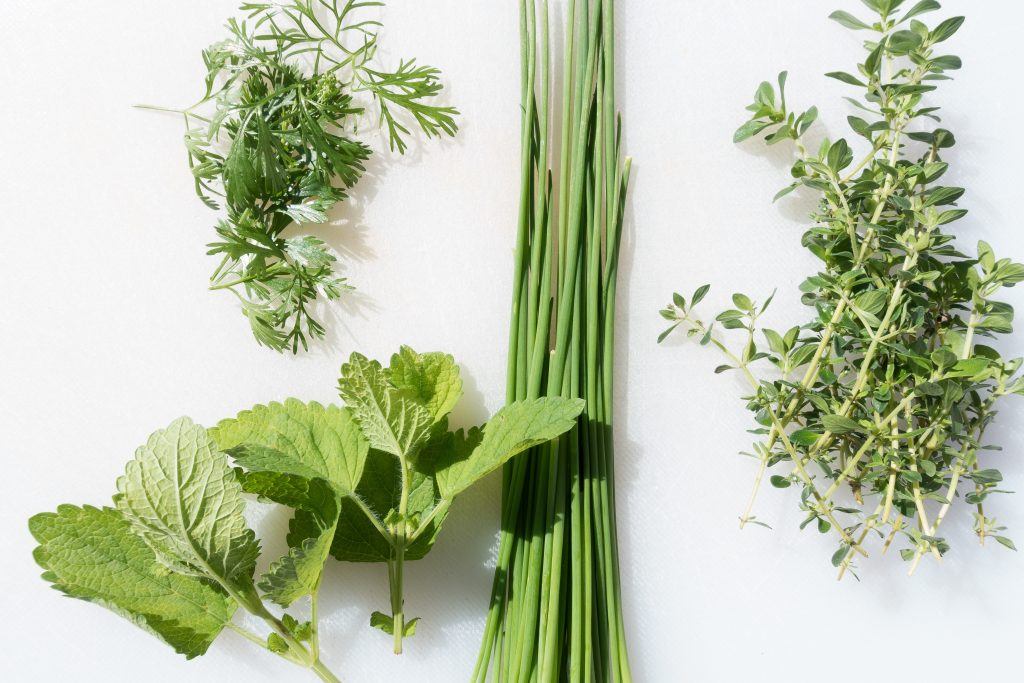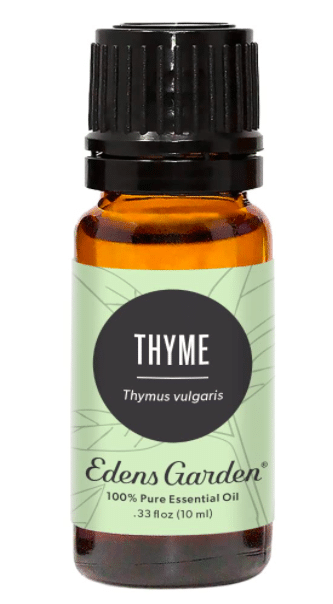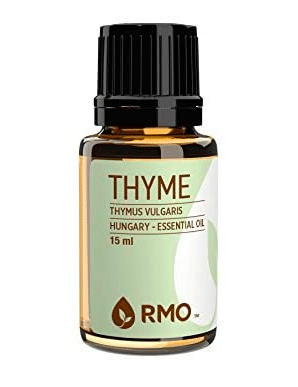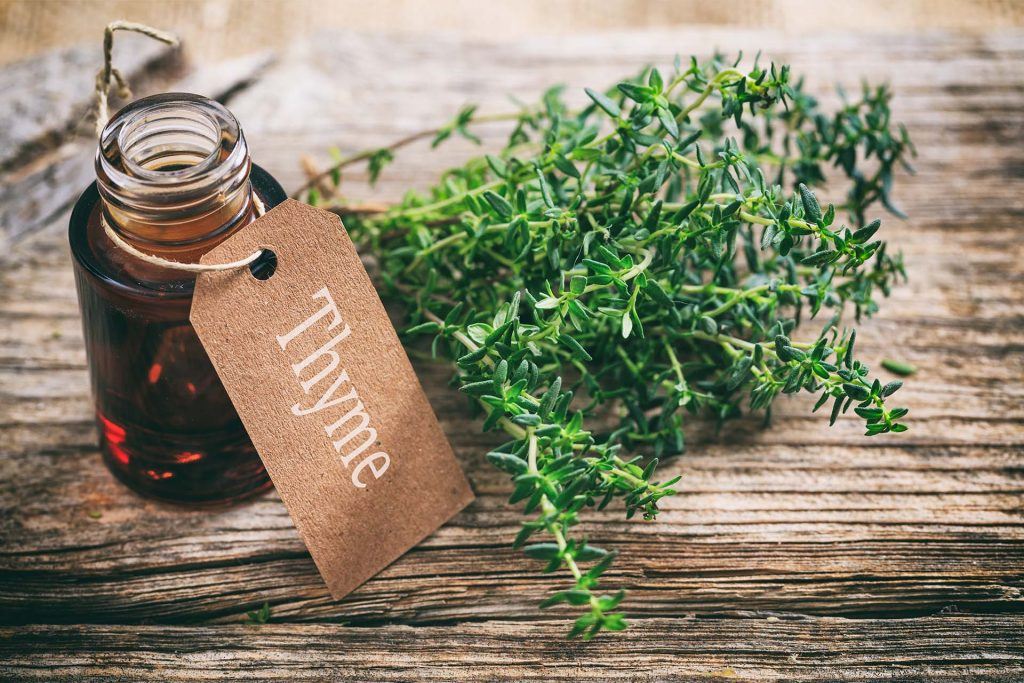Thyme isn’t just another herb you throw into a pot of soup or spaghetti but something you can throw on yourself for a variety of healing properties.
In this article, we will visit some of the most helpful ways thyme oil (referred to sometimes as Thymol) is used, its primary benefits, and the different varieties of thyme.
With healing properties such as being an excellent analgesic, stimulant, and expectorant as well as a powerful antibacterial and antiviral agent, you may be willing to smell a little like dinner if it means healing!
Table of Contents
What is Thyme Essential Oil?
Thyme is a fragrant herb originating from the Mediterranean. It is a common plant found all over North America, and it is easy to grow at home. It has been used for centuries for everything from embalming to antibacterial uses. We will get more into benefits and uses in just a bit.
Thyme oil is also referred to as “oil of thyme” or Thymol. Thymol is one of the naturally occurring classes of compounds known as biocides. These are substances that can destroy harmful organisms, such as infectious bacteria.

Thyme is a perennial plant and part of the mint family. The thyme plant has relatively tiny, green leaves on thin, flexible stems. When planted in a pot, as it grows, the stems will spill over the edges giving it the look of a ground covering type of plant. Thyme usually gets between six and twelve inches big depending of course on how much you use and how well you tend to the plant.
How Oil is Made
Once the plants have been harvested, the leaves are then dried. Once the leaves are dry, they are beaten off the stem. Thymol or oil of thyme comes from the dried leaves of the plant through steam distillation.
Traditional Medicinal Uses
According to Medical News Today, “The ancient Egyptians used thyme as an embalming fluid. In ancient Greece, they used thyme as incense in temples and added it to bathwater. Hippocrates, who lived around 460 BCE to 370 BCE and is known today as “the father of Western medicine,” recommended thyme for respiratory diseases and conditions. People grew thyme in gardens and gathered it in the countryside.”
Medical News Today
Thyme Essential Oil Uses & Benefits
No One Has Thyme for Acne
Whether you are a teenager in the throes of adolescence, dealing with food allergies or diet issues or if you’re a woman combating her monthly cycle, most of us get acne to some degree. When looking for a solution outside of the harsh chemicals at the drug store, thyme is your go-to oil for acne.

Thyme is known to have intense antimicrobial properties. In fact, one study looked at the antimicrobial activity of thyme oil and oregano oil for treating acne vulgaris.
The findings indicated that thyme oil combined with oregano oil worked well in the treatment of acne compared to the other five essential oils that were looked at.
How to Use
If you wanted to try out this oil for acne, be sure to dilute it properly with a carrier oil such as coconut oil. Then perform a small patch test, especially if you are new to this oil or have sensitive skin.
Kills Bacteria in No Thyme
Thyme oil contains antiseptic components, caryophyllene, and camphene that help control and kill bacteria.
A 2011 study from the Medical University of Lodzin Poland tested thyme oil’s response to 120 strains of bacteria. The results show that thyme oil was extremely resistant to the strains of bacteria. Thyme oil even demonstrated a good efficacy against antibiotic-resistant strains.
What does this all mean? Bacteria over the years has become resistant to many of our modern-day antibiotics. Thyme oils showing positive efficacy against antibiotic-resistant strains means the resistant bacteria aren’t resistant to thyme oil.
This finding is promising news in the medical field in treating bacterial infections that no longer respond to standard antibacterial courses of treatment.
Colds Don’t Have to Take Up All of Your Thyme
In addition to thyme being an antiseptic as well as antibacterial, research has shown that it is also antispasmodic, meaning it calms spasms of the muscles, it is excellent in calming down a cough.

Several natural cold remedies and cough drops contain high levels of thyme. Ricola and Celebration Herbals cough drops contain thyme most of the time, which is a great way to get your thyme in!
How to Use
Additionally, when you’re sick, diffusing thyme oil in either your nebulizing diffuser or ultrasonic diffuser is an excellent way to expose your respiratory system to the healing properties of thyme!
Other Benefits and Uses with Thyme
Insect Repellant
Ah..summertime…the sun is shining…but that also means that the bugs are out. Do you want to keep the bugs away the natural way without getting your DEET spray out?
Did you know that thyme oil may be able to help? One study looked at Thymus vulgaris (common thyme) for repelling mosquitos and found that it was very effective in repelling mosquitos. Specifically, a 91% protection rate!
How to Use
If you want to try out this oil for repelling bugs, check out our article on which other essential oils you can combine this oil with to keep the bugs away!
Hair loss
Hair loss at any stage of life can be devastating. Usually, there is a reason for hair loss, but not many treatment options.
One particular study looked at thyme oil along with lavender, cedarwood, and rosemary oil for alopecia areata, which is an autoimmune condition that makes you lose your hair in patches usually due to severe stress.

Researchers found that the group that used the above essential oils diluted with a carrier oil on their scalps saw more improvement in hair regrowth compared to the control group that only used carrier oils on their scalps.
Although thyme oil was not the only oil that aided in hair regrowth in this study, these are still promising results for this condition!
How to Use
If you want to try this oil for hair loss you can add 10 drops of thyme oil to one-half cup of the shampoo of your choice. Use it 2-3 times a week to moisturize your scalp and reduce itchiness.
Another method is to add a few drops of tea tree oil to some coconut oil and massage it into your scalp.
Essential Oil Safety
If you plan to use this oil topically, such as in a massage oil, please make sure to dilute this oil properly with a carrier oil. Then perform a small patch test, especially if you are new to this oil or have sensitive skin.
Best Thyme Essential Oils
Now, let’s get into some of our favorite thyme essential oils!
Edens Garden
If you’ve been reading some of our other articles, you may know that Edens Garden is almost always mentioned as one of our favorite brands for essential oils. This is again due to the affordability, accessibility, and quality of their oils.
Additionally, the company prides itself on great customer service. If you have any issues with their oils, they are always willing to help.

They have two varieties of thyme oil: Thymus vulgaris (common thyme) and red thyme essential oil. We particularly love their common thyme oil.
It’s perfect for aromatherapy purposes. Add a few drops to your diffuser and enjoy the benefits!
Rocky Mountain Oils
RMO delivers on their quality every time. Their customers are continually raving about the quality of their oils. This oil is not any different.

Customers love to use this oil on the skin and scalp! As always, if you plan to use this oil topically, please make sure to dilute this oil with a carrier oil before application, and perform a small patch test.
What is the difference between red thyme and white thyme?
The main difference is concentration. Both red thyme and white thyme are extracted and steam distilled from the same plant.
White thyme is a further distillation of red thyme, creating a thinner and less concentrated product.
Does thyme have any side effects?
The United States Food and Drug Administration (FDA) classifies thyme essential oils as “generally recognized as safe for their intended use.”
Do not use if you are nursing, pregnant, suffer from high blood pressure, a heart condition or if you are allergic to thyme.
Thyme to Go!
Thyme is an underrated oil not because of its lack of potency, but mostly because of the scent. It is a delightful oil, with earthy notes reminiscent of wood along with hints of citrus.
We hope you have found the information helpful and are inspired once again to dive into the beautiful world of essential oils.

